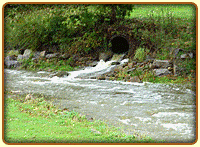Storm Water Management
Report Illicit Discharge
Developing and implementing a plan to detect and eliminate illicit discharges to the storm sewer system (includes developing a system map and informing the community about hazards associated with illegal discharges and improper disposal of waste).
What is illicit discharge?
Federal regulations define an illicit discharge as any discharge to the storm sewer system that is not composed entirely of stormwater. There are exceptions to this rule: firefighting activities, landscape irrigation, foundation drains, waster from crawl space pumps etc. Sources of illicit discharges include: sanitary wastewater, failing septic systems, car wash waste water, improper disposal of household toxins or improper use of pesticides and herbicides etc. Illicit discharges enter the system wither through direct connections (deliberate pipe hookups to the storm drain system) or indirect connections (spills collected by drain outlets, or deliberate dumping down the storm drain.) These illicit discharges drain directly to the creeks and streams and may be loaded with a large amount of harmful and toxic substances. These pollutants enter the aquatic system and degrade the water quality and threaten wildlife and human health.
London Grove Township, as well as many other communities in the Southern Pennsylvania region, recently was required to obtain a permit from the Pennsylvania Department of Environmental Protection (PA DEP) for its storm drainage system. This permit required the Township to locate and map all stormwater piping and drainage ditch systems owned and maintained by the Township. The permit also requires the Township to inspect these drainage systems periodically to detect any “illicit discharges” from the systems.
What in the world is an illicit discharge? Simply stated, an illicit discharge is something that is exiting a storm drainage pipe or drainage ditch that is not stormwater and potentially could pollute our streams. Examples of illicit discharges that would be typical for a community like ours are septic system overflows, sanitary wastewater, chlorinated pool water, paints, oil or other vehicle fluids, etc.
While the Township has inspected its drainage system thoroughly once since the permit was issued, our inspectors can not be everywhere all the time. If you happen to see something exiting a storm pipe or ditch that looks, smells or feels like something other than stormwater, please contact the Township so we can track it to its source and keep our streams as clean and pure as possible. To report an illicit discharge call Ken Battin at the Township, 610-345-0100 or send an email to kbattin@londongrove.org
Please report illicit discharges to the Township: 610-345-0100.
Stormwater Tips
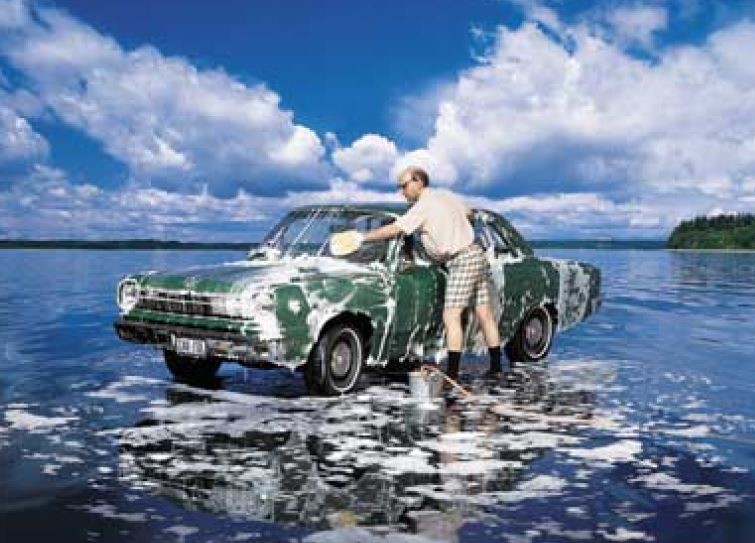 Auto Care: Washing your car at home on the driveway or street can send detergents and other contaminants through the storm sewer system. It is best to wash your car at a commercial car wash where the wastewater is treated and recycled. If you do wash your car at home, do so near a grassy area where the water can infiltrate into the ground. And never dump motor oil or antifreeze into the storm drain. Dispose of these at a local service station or approved recycling center.
Auto Care: Washing your car at home on the driveway or street can send detergents and other contaminants through the storm sewer system. It is best to wash your car at a commercial car wash where the wastewater is treated and recycled. If you do wash your car at home, do so near a grassy area where the water can infiltrate into the ground. And never dump motor oil or antifreeze into the storm drain. Dispose of these at a local service station or approved recycling center.
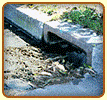 Only Rain in the Drain: Never dump anything into a storm drain, including oil, paint, soap, debris, and leaves. Storm sewers don’t go to the sewer plant but discharge directly into streams. You might be pouring oil into your own drinking water!
Only Rain in the Drain: Never dump anything into a storm drain, including oil, paint, soap, debris, and leaves. Storm sewers don’t go to the sewer plant but discharge directly into streams. You might be pouring oil into your own drinking water!
 Pick Up After Your Dog: Pet waste can be a major source of excess nutrients and bacteria to our streams. Always properly dispose of pet waste.
Pick Up After Your Dog: Pet waste can be a major source of excess nutrients and bacteria to our streams. Always properly dispose of pet waste.

When Your Car’s Leaking Oil On The Street, Remember It’s Not Just Leaking Oil On The Street: Leaking oil goes from car to street, and is washed from the street into the storm drain and into our lakes, streams and into coastal waters. Now imagine the number of cars in the area and you can imagine the amount of oil that finds its way from leaky gaskets into our water. So please, fix oil leaks!
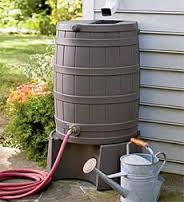 Downspouts: Direct all downspouts away from pervious surfaces and onto lawns. Rain barrels can be used to collect water from downspouts, making it available for watering.
Downspouts: Direct all downspouts away from pervious surfaces and onto lawns. Rain barrels can be used to collect water from downspouts, making it available for watering.
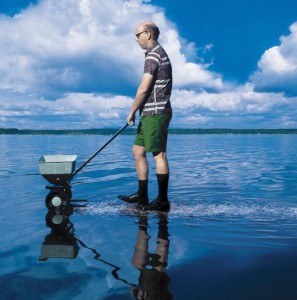 Lawn Care: Fertilizers and pesticides should be used sparingly. When applied in excess, these chemicals are washed off by rainwater and enter the local storm sewer system. Do not sweep yard waste and leaves into the street. These add extra nutrients to streams.
Lawn Care: Fertilizers and pesticides should be used sparingly. When applied in excess, these chemicals are washed off by rainwater and enter the local storm sewer system. Do not sweep yard waste and leaves into the street. These add extra nutrients to streams.
Plant Native Trees and Shrubs: Erosion of stream banks can be prevented through the use of vegetated strips along the banks. Also known as riparian buffers, these strips of tall grasses, trees and flowers act to stabilize banks, which prevents erosion and additional sediment load in the stream. Click here for a “Native Plant List.”
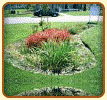 Rain Gardens: A specially designed rain garden can be planted with native vegetation to that will provide an area for rainwater to collect and soak into the ground. Stormwater from rooftop drains and pavement areas can be directed to these vegetated areas. Click here for Rain Garden instructions.
Rain Gardens: A specially designed rain garden can be planted with native vegetation to that will provide an area for rainwater to collect and soak into the ground. Stormwater from rooftop drains and pavement areas can be directed to these vegetated areas. Click here for Rain Garden instructions.
Stormwater Educational Materials
Below are Stormwater educational pamphlets and materials prepared by the Pennsylvania Department of Environmental Protection (DEP).
- After the Storm (The Basics of Storm Water)
- Car Washing Facts
- Don’t Top Off at the Pump
- Drinking Water – Resolve to Protect It!
- Fertilizer Tips
- Leaking Oil Facts
- MS4 Frequently Asked Questions
- Only Rain in the Drain
- Pet Waste Tips
- Protecting Water Quality from Urban Runoff
- Rain Garden Enhancement Guide
- Rake it or Leave it!
- Septic System Tips
- Solution for Pollution
- Take the Stormwater Runoff Challenge!
- The Ten Principles of Storm Water
- Trees & Storm Water
- Water Efficient Landscaping
- We All Live Downstream
- When it Rains in Drains!
- Winter Yard Care Tips
Resources to Help Homeowners
Below is a list of links to some useful information to help you manage stormwater on your property.
- General Stormwater Information – An Overview of the important of managing your stormwater
- Chester County Automotive Waste Drop off Centers
- Hotlines for Chester County
- Hot Tips for a Cool Lawn – Best Practices for Lawn Maintenance
- How Much Rain can you Retain – Downspout Redirection
- Swimming Pool Regulatory Guidance
- Water Conservation Tips
- Winter Deicing tips for residents
- Stormwater Information for Homeowners
Construction Related Activities
- Best Management Practices for Developers
- Construction Stormwater Runoff
- Cover Your Materials & Equipment
- Dust Control Tips
- Employee Training
- Only Rain in the Drain
- Permit FAQs
- Residual Handling & Disposal
- Sample Stormwater Pollution Prevention Plan
State & Federal Stormwater
- Chester County Conservation District
- Environmental Protection Agency – Stormwater Program (NPDES)
- Environmental Protection Agency – Polluted Runoff
- Environmental Protection Agency – MS4 Main Page
- DEP Bureau of Watershed Management
Want to Learn More
Click here to check out “A Homeowners Guide to Stormwater Management” and a brochure on “Caring for Your Streamside Property”
Click here to visit CWMP to learn more about Stormwater Management and MS4

